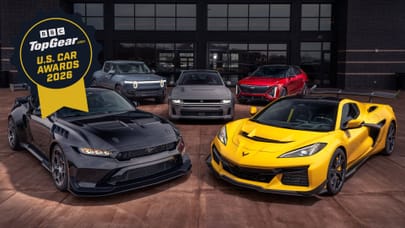
Clarkson on: petrol
Because I own a teenage daughter, the television in my house is almost always tuned to a music-video station on which a selection of furious young men in stupid trousers urge their followers to take up gardening. It's a non-stop stream of instruction to "kill a pig" and "do some hoeing".
Strangely, there seems to be very little actual gardening in the videos, but there are a lot of cars. And here's something I've noticed. The chaps in their enormous baggy gardening trousers drive around incredibly slowly. More slowly even than Percy Thrower, who, of course, is dead.
This is a disturbing development. There was no such thing as a music video when I was growing up, but I feel fairly sure that if Led Zeppelin had made such a thing, and they had felt inclined to feature a car - which is unlikely - they would not have been pottering about at 12mph.
Proper rock stars who could actually play an instrument had Ferraris which they drove at preposterous speeds, usually into a swimming pool. And it was the same story with people in the movies. James Dean was not doing 12mph when he hit Mr Turnipspeed. And Steve McQueen did not dawdle round San Francisco in his Mustang. He flew. Literally. Speed was good. Speed worked.
When I was growing up, we all wanted to drive fast. Driving fast and doing handbrake turns and spinning the wheels when pulling away from the lights: none of these things had been proven to win a girl's heart, but we knew from the way they giggled as we flew by that they loved us for it. They thought we were real men. So we went even faster until we crashed.
A car's top speed was everything. Everyone had a mate called Kev whose Fiesta could do 150. We all had stories about beating Porsche 911 turbos on the ring road. And traffic lights weren't signals to aid with the commuter flow of a morning. They were start signals. Red: rev. Orange: rev more. Green: dump the clutch. In my mind, that's what it said in the Highway Code back then.
The first time I was stopped by the police for speeding - and this happened very infrequently - I was so embarrassed that it had only been 88mph that I told my mates it was 118. And even then, they weren't impressed because, as we know, all of them had a mate called Kev whose Fiesta could do 150.
Now, at this point you are probably expecting me to call for the young people of today to put away their cycling helmets and their high-visibility safety vests and get a bloody move on. But I'm afraid there's absolutely no point. Because it's impossible.
It's not health and safety that's slowing them down. Young men are not programmed to tip-toe when they can tombstone. And nor is it those young role models on MTV or whatever it's called these days. If youngsters really were listening to what that lot had to say, they'd all be out in the garden, rearing pigs for market and weeding the veg patch. And they're not.
It's not the government's relentless war on speed either, or Jonathan Porridge running about telling everyone that the ice cap is melting, because of course, we now know that this year, the volume of polar ice has increased dramatically.
No. The real reason that kids in music videos - and in the real world - don't really drive fast any more is that, with petrol at £6 a gallon, it's simply too expensive.
And it's not just kids either. Formula One drivers go slowly - they say - to preserve their tyres. But this is nonsense. It's because Vodafone can't afford the fuel bills. The producer of TopGear recently took a supercharged Range Rover to the Alps so he could spend a week falling over and came back bankrupted by the V8's thirst.
I know enough about the economy to know that there is such a thing as inflation, but the fact is this - inflation is not the only reason why it used to cost £3 to fill the tank of my car, and now it costs £120. Going to London and back at a lick in the Mercedes, sets me back around £50. Out of taxed income, that's £100. That's £500 a week. And that's £25,000 a year. Which is more than the average national wage.
The first time I was stopped by the police for speeding, I was so embarrassed it had only been 88mph that I told my mates it was 118
This, then, is why kids are driving slowly. Because although they now get their music for free, you can't download spot cream, or vodka, and there simply isn't enough left over to burn a gallon simply pulling away from the lights.
I suppose, if I'm honest, it's not just kids either. The same applies to pensioners and families. Everyone really, except Elton John. Driving fast is no longer a rite of passage. It's a luxury only a very few can afford, and I think it's time car makers responded to this.
Many will say at this point that they are. Mercedes has teamed up with Renault and Nissan to work on a range of new small cars. Battery power is being shoehorned into the Mini, and everyone is busy developing hybrids. But they are forgetting something. They seem to be equating the cost of the car with the cost of running it, and the two don't always go hand in hand.
I don't mind buying an expensive car, but I do mind standing at a filling station watching the digital read-out adding noughts to my credit-card bill for a tankful of something I can't even see. I therefore find myself wondering in these difficult times if perhaps someone in the motor industry could dig out some details of the old Renault 5 Monaco.
It was, as you would imagine, a Renault 5, which means it was a small economical car. But inside, it was fitted with electric windows - rare for the time - power steering, sumptuous leather seats and a decent sound system. It was, in other words, a small luxury car. Is such a thing out of the question today?
When car makers think small, they think cheap. They therefore fit it with skinny tyres and suspension made from tin-foil and interior panels affixed in place with poppers rather than screws. But what if, say, Mercedes applied exactly the same principals they use to make an S-Class to a Smart?
I'm sure, of course, that if it had radar-guided cruise-control and a hands-free telephone and a Bang and Olufsen stereo and seats which are like sitting on Dawn French, it would be expensive to buy. And the car makers would argue that no one would spend £40,000 on a Smart. But why not?
I don't want a big car, particularly. I have no need for acreage, and I really don't like the fuel bills. But I don't want a small one at the moment because they're all like supermarket own-brand cola: weedy imitations of the real thing. What I would like - and I suspect I'm not alone in this - is a small economical car that's built and equipped like a big one. A Phaeton in a Golf suit, if you will. Or a Freelander with absolutely everything you get on a Vogue SE. Or, better still, a Fiat 500 which feels like a Maserati Quattroporte.
I do not believe that such a thing would be impossible, and I believe the profit margins for the car makers would be great. So they make money. And I save it at the pumps. This is what comes, I suppose, from turning 50, something I did last month: vision, and wisdom.
This article was first published in the June issue of TopGear magazine
Top Gear
Newsletter
Thank you for subscribing to our newsletter. Look out for your regular round-up of news, reviews and offers in your inbox.
Get all the latest news, reviews and exclusives, direct to your inbox.
Trending this week
- Car Review
BMW 1 Series








